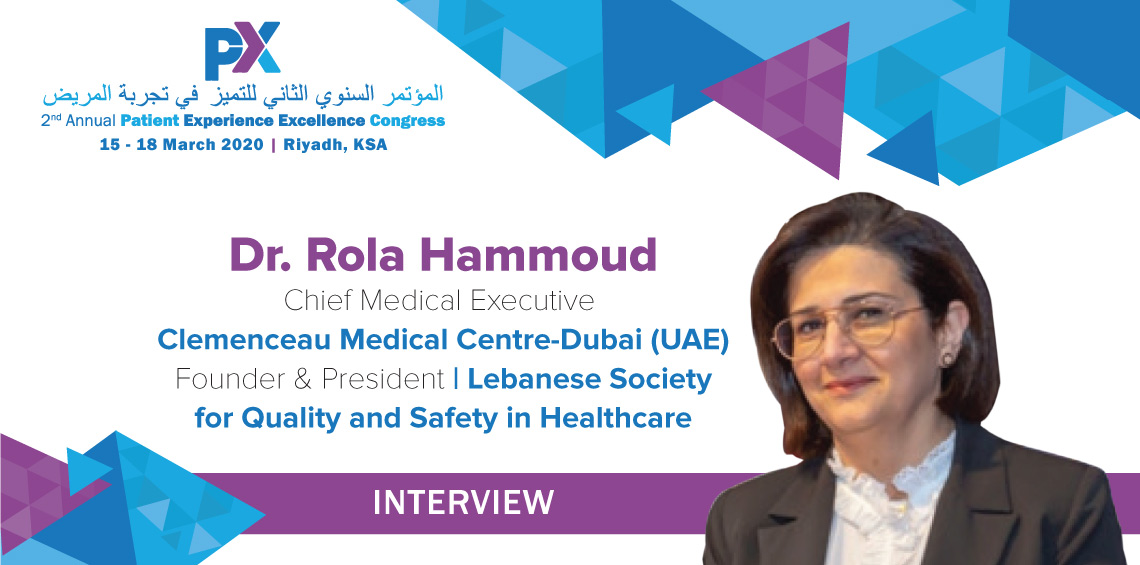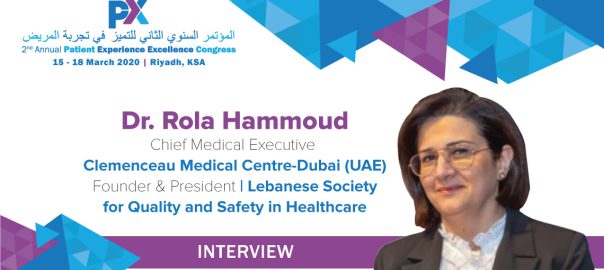Rola Hammoud is American Board Certified in Healthcare Management from the American College of Healthcare Executives and is certified from the Harvard Business School in the “Management of health care delivery for executives”.
She Holds a Masters in Hospital Management from ESA business school and University Paris VII (France), a Teaching diploma and a Mediation diploma.
In addition, she is an academic Lecturer on Patient Safety and Risk Management and a reviewer for anesthesia and quality journals.
Interview
What steps CMC leadership have taken to better integrate and enhance the delivery of exceptional patient experience?
CMC thought about the patient experience from the design until after the delivery of care. Designing a hospital that is friendly to patients, taking into consideration the warm environment, spacious spaces, hand made art works, comfortable furniture…etc… During the design, patient workflows were studied to keep patient moving between departments to a minimum. At CMC Dubai, our IPTV are an excellent tool to keep our patients engaged, they will be able to choose their menu, record their subjective information, know about their care plan and discuss it with their care giver.
Multidisciplinary teams discussion and bed side handovers are important tools to ensure the continuity of care while involving patients with all their healthcare providers together.
Regular patient experience officers visits to our patients ensures immediate recovery to issues and anticipate others from occurring.
After discharge, although we send an electronic survey to all our patients, we will call all ER patients to ask about their satisfaction with our care and the management of their case.
Timely and explicit medical error disclosure is essential to maintain a strong bond of trust between physicians and their patients. What according to your practice should be done to reduce the wide gap between patients’ demands of transparency in disclosing all medical errors and attempts of healthcare providers to do so?
Patient engagement in his care is necessary since his first visit to a physician. Building trust happens because of a mutual respectful relationship. This happens when the physicians take time to explain to their patients what is happening with them; their disease and its management in a very transparent way.
respecting patient right in his autonomy is important, explaining all risks, benefits and alternatives to each treatment engages patients to ask more and learn more. Teaching our community is another commitment to enhance patient engagement. Patient trust is an important building block to establish a strong relation with his physician, a relation where the patient will also understand all explanations related to medical error and complications.
Do you think in case of medical errors, quite often than rare do second victims get the support that they need? What role should the front-line leaders play in mediating?
We have at CMC a program for those victims. We try to coach them and recomfort them to restore their self confidence and return to work safely.
Could you share exampIes where you have seen transparency, compassion and apologies heal patients, families and physicians?
Being anesthesiologist, I delt personally with many patients under the stress of going to surgery, this stress can be the trigger of many miscommunications that might result in dissatisfaction. I use always the listening mode with those patients to encourage them to speak more .
As a Chief Quality Officer, I also used to receive complaints. Apologising on behalf of the team is definitely a reassuring methodology. Rare are the patients / families who were not satisfied after our meeting.
What is your patient experience plan for 2020 what will you do differently?
Engagement is now important. Education, information, involvement in the care, pharmacist explanation of treatment. Daily visit of dietitians. Bed side handover…etc.. are our new approach for 2020.



